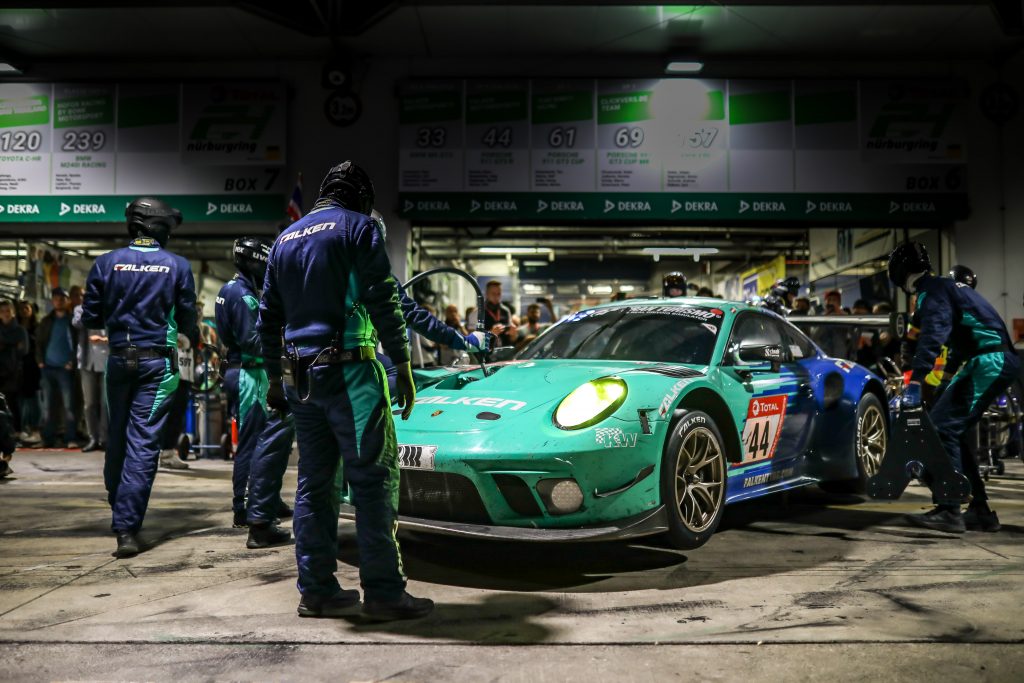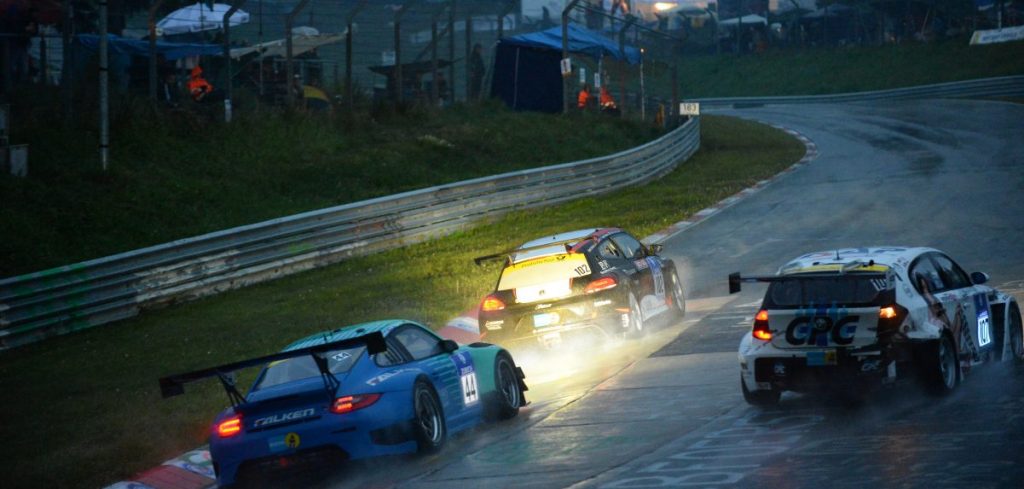With the Nurburgring 24 shifted to later in the year, the race will feature a much-reduced field, cooler temperatures, and the potential for more extreme weather and a longer stint in darkness. PWM spoke to three of the Falken Motorsport team’s drivers, Martin Ragginger, Klaus Bachler and Christian Engelhart, to find out how their preparations had been adapted.
The race is being held in late September. What’s the impact of this on the team and drivers?
MR: It’s later in the summer so that’s going to affect temperatures. The weather has been pretty good recently at the Nürburgring, but we’ll have to see what that’s like when we get there. It’s always a place where it can change lap-by-lap, minute-by-minute. Running in late September means it’s likely to be cooler and that will drive us to softer tire compounds. More of the race will be run in the dark too. That cooler air will help but we’ve also got to balance this with the risk of more leaves on the circuit. We’ve seen this cause a problem for other cars in NLS races.
KB: I’d add that the lack of fans will make a big difference to how the 2020 event feels. The formation lap, where fans can come on the track is something very special, truly amazing; both fans and drivers will really miss it. I also hoped to have family out with me but that’s not to be this time. It’s a real shame but it’s great we can still race and provide some entertainment for the fans at home.
CE: I’ve been fortunate to do the formation lap and it is incredible. No fans at night will also be strange. It really adds to the atmosphere. You’ve got the flashlights, the smoke drifting across the track. You don’t know if the smoke is from a car or a barbecue until you drive through it and they smell different! Drivers often talk about the impact of having the fans at an event and I think we are really going to miss them but how much I’ll only be able to say once we have experienced it. It’s going to be quite dark out there!
Has the late start to the season affected tire development?
CE: The whole season has shifted so we’ve still been able to test at the NLS races. I haven’t had any wet running this year at the Nürburgring. The lack of wet running will be the same for all the competitors if it rains at the N24.
KB: We were fortunate to get a test in at Portimão before the lockdowns. That helped us build on the progress we made last year, which I feel gives us more confidence in both the performance and grip. We’ve got good communication between the drivers and the engineers in Japan, so we have found solutions to keep progressing. I feel we are in a good place with our development.
MR: We made good steps forward at the Portimão test and continued that in the NLS rounds. I think we’ve made improvements in all areas. The feel is improved, so we can push a little more. It’s all about small details at this level. You have the best tire makers in the world. It’s marginal gains that are being found and that’s what we are all working on.
This year Falken is running two Porsches. Has that accelerated tire development or did running two different cars as you did last year make more of a difference?
MR: There are positives to running two of the same car. We’ve got more data to review and we can try different things with tires and setup within fewer events. We’ve also got eight different drivers, many with masses of Porsche experience. That’s been a big benefit. Of course, having the different cars as we had before spread our chances with BoP but overall, two Porsches has been a benefit to the program.
KB: It’s been very constructive. I think also running in the recent six-hour race with all the drivers out was good preparation and learning for us all. I’ve only done that event and the official test in mid-June with Falken in 2020 but I could feel we had made progress from 2019 so the two-car program is definitely working.
CE: We’ve all worked really well together this year across the two cars. It’s a strong line-up with a lot of experience. We are quite different drivers in terms of our age and history, but we are very closely matched and it’s been great to work on the Falken program this year. We might all like slightly different things – more oversteer/understeer perhaps – but ultimately we all want to have a balanced car. There are nuances to getting tires to work on a Porsche and we can focus on that this year with two of the same car. In a 911 you have a lot more energy going through the rear tires, for example. Aside from the tires, I’d also add that Porsche has done a great job and the engineers at Weissach have created a GT3 car that can compete with any other out there.
We’ve mentioned the fans but there are fewer entrants – around 100. Will that make for such a different race?
MR: We’ve probably got a similar number of GT3/SP9 cars but absolutely, fewer cars means it could be a faster event if the weather stays dry. It’s not just the overtaking but I think we’ll see less Code 60s. With more Code 60s, we lose tire temperature that blunts our speed. I really like the test of overtaking the other classes. It’s a cool challenge and gets the adrenalin pumping, but fewer Code 60s will make it a much quicker pace.
KB: It’s very sad for the sport that we have fewer entries. For sure there are risks with passing the slower cars but I’d like to see healthy grids with more competitors. The mix of cars and the chance for a range of drivers to take part is a major attraction of this race, and honestly I’d prefer to have more cars out there for the sake of our sport.
CE: It’s a real shame not to have all the competitors on track. The challenge of the traffic is part of the event, part of what makes it brutal. That said, there is a chance for this to be a race with fewer Code 60s, which would make it special and fast!




